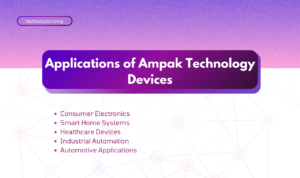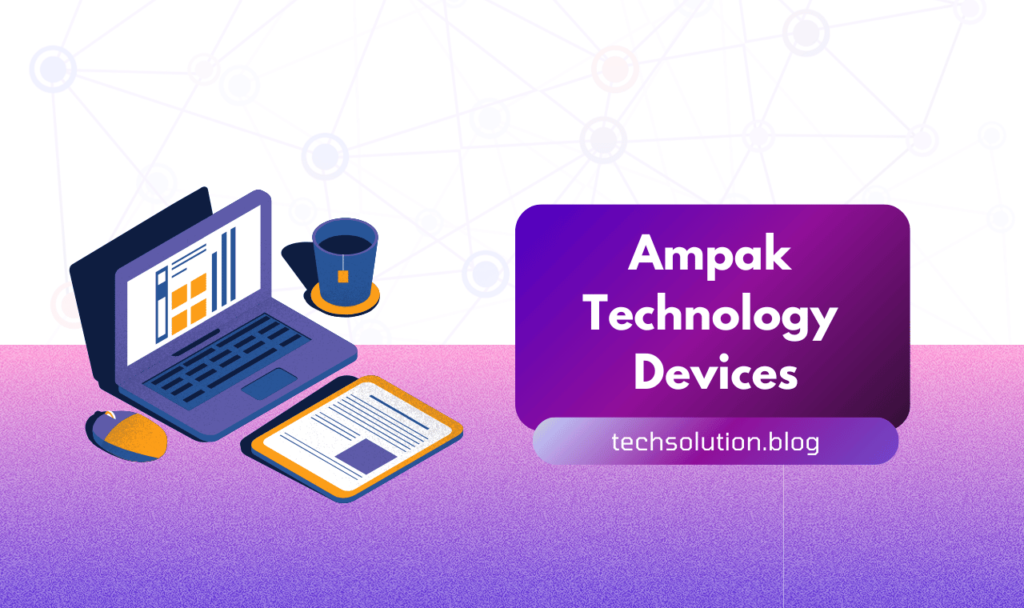When it comes to technological advancements in the field of wireless communication and connectivity, one name that frequently emerges is Ampak. If you are in the market for smart devices, routers, or any technology that relies on stable, high-speed communication, chances are you’ve already interacted with Ampak technology without even realizing it. But what exactly is Ampak, and what role does it play in modern tech ecosystems?
In this article, we’ll dive deep into the world of Ampak technology, explore the types of devices and solutions it powers, and understand why it’s becoming increasingly essential in today’s connected world. From wireless modules to IoT (Internet of Things) applications, Ampak is a significant player. By the end of this read, you’ll have a solid understanding of Ampak technology devices and might even discover a solution you didn’t know you needed.
What is Ampak Technology?
Ampak Technology Inc. is a Taiwanese company that designs and manufactures wireless communication modules. These modules are essential to various devices, from consumer electronics like smartphones and tablets to industrial equipment that requires constant connectivity. Ampak provides solutions that facilitate wireless communication between devices using technologies such as Wi-Fi, Bluetooth, GPS, and even combinations of these technologies.
The name “Ampak” might not be as widely recognized as brands like Intel or Qualcomm, but make no mistake—Ampak plays a critical role in keeping our devices connected. Its wireless modules are often embedded inside devices, enabling them to connect to Wi-Fi networks, Bluetooth accessories, or GPS satellites.
Why is Ampak Important?
Wireless technology has become the backbone of modern living. Almost every device we interact with, from smartphones to smart home systems, requires a reliable communication method without physical connections. Ampak technology excels in providing these wireless connections, ensuring that devices can seamlessly interact with one another.
In a world where smart devices are becoming more ubiquitous, Ampak modules help ensure smooth, reliable communication. Whether enabling wireless speakers to connect to your smartphone via Bluetooth or allowing smart refrigerators to communicate with your home network, Ampak technology is critical in making these everyday conveniences possible.
Types of Ampak Technology Devices and Solutions

Ampak technology devices cover a wide range of applications. From the simplest consumer electronics to highly specialized industrial solutions, Ampak provides versatile modules that meet various connectivity needs. Below are some of the key areas where Ampak technology shines:
1. Wi-Fi Modules
Wi-Fi has become an indispensable part of modern life, and Ampak’s Wi-Fi modules help power that connectivity. These modules are crucial whether you’re streaming high-definition video, making a video call, or uploading large files to the cloud. Ampak provides wireless modules that can deliver high-speed internet access with stable performance. These modules are commonly found in devices such as routers, smart home systems, and various IoT devices.
Ampak’s Wi-Fi modules are designed to provide low power consumption, long-range communication, and easy integration, making them ideal for both consumer electronics and industrial applications.
2. Bluetooth Modules
Bluetooth technology has revolutionized the way devices communicate wirelessly over short distances. Ampak’s Bluetooth modules offer highly efficient wireless communication for low-power devices. These modules are commonly found in products like wireless headphones, fitness trackers, smartwatches, and even in-vehicle entertainment systems.
Ampak’s Bluetooth modules ensure quick pairing and stable communication, making them reliable for wireless audio transmission, device synchronization, and hands-free communication.
3. GPS Modules
In addition to Wi-Fi and Bluetooth, Ampak also produces GPS modules for devices that require precise location tracking. These modules are especially useful in applications like fleet management, navigation systems, and even outdoor sports devices.
Ampak’s GPS modules offer low power consumption and high accuracy, making them an excellent choice for battery-operated devices that require precise location data.
4. Combo Modules
Ampak’s ability to combine multiple wireless technologies into a single module makes it truly versatile. Combo modules are becoming increasingly popular, especially for IoT applications where a device may need to communicate via Wi-Fi, Bluetooth, and GPS simultaneously.
Ampak’s combo modules allow for seamless communication between multiple devices and networks, making them ideal for smart home systems, security devices, and industrial monitoring systems.
5. IoT Solutions
The Internet of Things (IoT) is one of the fastest-growing technology sectors today, and Ampak has been quick to capitalize on this trend. Ampak technology is frequently embedded in IoT devices that require constant, low-power wireless communication. These include smart appliances, wearable technology, and industrial monitoring systems.
With the rise of smart cities, automated industries, and smart homes, Ampak’s role in IoT applications will only continue to expand. Ampak provides the necessary wireless modules to keep these IoT ecosystems connected and functional.
Applications of Ampak Technology Devices

Ampak’s wireless modules are highly versatile and can be found in various devices and industries. Below are some specific applications where Ampak technology devices play a crucial role:
1. Consumer Electronics
Ampak technology is commonly found in consumer electronics such as smartphones, tablets, laptops, and smartwatches. These devices rely on Ampak’s Wi-Fi and Bluetooth connectivity modules, ensuring smooth internet access and seamless device-to-device communication.
2. Smart Home Systems
From smart thermostats to security cameras, Ampak’s wireless modules enable the connectivity of smart home systems. These modules enable devices to communicate over Wi-Fi or Bluetooth, creating a cohesive smart home experience that you can manage from your smartphone.
3. Healthcare Devices
In the healthcare industry, Ampak’s technology powers various medical devices that require wireless communication. These include wearables like fitness trackers and heart rate monitors that send real-time data to healthcare providers for continuous monitoring.
4. Industrial Automation
Ampak modules are also widely used in industrial applications that require machine-to-machine communication. Whether it’s monitoring the condition of machinery or ensuring the seamless operation of automated processes, Ampak technology helps maintain efficient industrial operations.
5. Automotive Applications
Automotive manufacturers have increasingly turned to Ampak technology to enable wireless communication within vehicles. Bluetooth connectivity for hands-free calls, Wi-Fi for in-car internet access, and GPS navigation are all powered by Ampak’s wireless modules.
Pros and Cons of Ampak Technology
Pros |
Cons |
| Wide range of wireless solutions (Wi-Fi, Bluetooth, GPS, and combo modules) | Limited brand recognition compared to competitors like Intel and Qualcomm |
| Reliable performance in consumer and industrial applications | Potential challenges integrating emerging technologies like 5G |
| Low power consumption, ideal for IoT devices | Requires technical expertise for effective implementation |
| Easy integration with existing systems and products | May not be the best choice for all industries, depending on specific needs |
| Supports high-speed wireless communication | Competition from larger companies in wireless technology space |
| Scalable for future technologies like 5G and AI | Limited availability of customer-facing products |
Conclusion
If you’ve ever wondered why your devices connect seamlessly or how smart home systems work smoothly, Ampak technology is likely the reason. Whether you’re a consumer seeking cutting-edge tech or a business integrating IoT, Ampak provides the solutions you need.
If you’re curious about the range of devices Ampak powers, here’s a summary: Ampak technology devices support various gadgets that simplify our lives. They offer an extensive list of solutions to meet nearly any connectivity requirement. Encounter an Ampak technology unknown device? You’re engaging with a leader in wireless communication.



